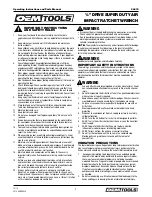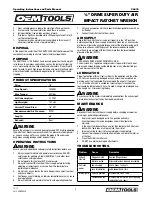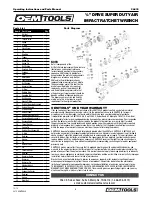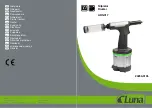
2
Operating Instructions and Parts Manual
24415
¼” DRIVE SUPER DUTY AIR
IMPACT RATCHET WRENCH
12/15
2015 OEMTOOLS
IMPORTANT INSTRUCTIONS
AND SAFETY RULES
1. Know your tool. Read this manual carefully. Learn the tool’s
applications and limitations, as well as, potential hazards specific to
it.
2. Keep work area clean and well lit. Cluttered or dark work areas
invite accidents.
3. Keep children away. All children should be kept away from the work
area. Never let a child handle a tool without strict adult supervision.
4. Do not operate this tool if under the influence of alcohol or drugs.
Read warning labels on prescriptions to determine if your judgment
or reflexes are impaired while taking drugs. If there is any doubt, do
not attempt to operate.
5. Use safety equipment. Eye protection should be worn at all times
when operating this tool. Use ANSI approved safety glasses. Everyday
eyeglasses are NOT safety glasses. Dust mask, non-skid safety shoes,
hard hat or hearing protection should be used in appropriate conditions.
6. Wear proper apparel. Loose clothing, gloves, neck-ties, rings,
bracelets or other jewelry may present a potential hazard when
operating this tool. Keep all apparel clear of the tool.
7. Don’t overreach. Keep proper footing and balance at all times when
operating this tool.
8. Check for damage. Check your tool regularly. If part of the tool is
damaged it should be carefully inspected to make sure that it can
perform its intended function correctly. If in doubt, the part should
be repaired. Refer all servicing to a qualified technician. Consult your
dealer for advice.
9. Keep away from flammables. Do not attempt to operate this tool
near flammable materials or combustibles. Failure to comply may
cause serious injury or death.
10. Store idle tools out of the reach of children and untrained persons.
Tools may be dangerous in the hands of untrained users.
11. Maintain tools with care.
12. Keep tools dry and clean.
13. Do not use a damaged tool. Tag damaged tools “Do not use” until
repaired.
14. Use only accessories that are recommended by the manufacturer
for your model. Accessories that may be suitable for one tool may
become hazardous when used on another tool.
15. Tool service must be performed only by qualified repair personnel.
Service or maintenance performed by unqualified personnel could
result in a risk of injury.
16. When servicing a tool, use only identical replacement parts. Use of
unauthorized parts or failure to follow maintenance instructions may
create a risk of injury.
17. Maintain a safe working environment. Keep the work area well lit.
Make sure there is adequate surrounding workspace. Keep the work
area free of obstructions, grease, oil, trash, and other debris. Do not
use this product in a damp or wet location.
18. Maintain labels and nameplates on this product. These carry
important information. If unreadable or missing, contact customer
service.
19. Before use, read and understand all warnings, safety precautions,
and instructions as outlined in the vehicle manufacturer’s service
manual. It is beyond the scope of this manual to properly describe
the correct procedure and test data for each vehicle.
20. Always perform vehicle service in a properly ventilated area.
Never run an engine without proper ventilation for its exhaust.
Stop work and take necessary steps to improve ventilation in the
work area if you develop momentary eye, nose, or throat irritation
as this indicates inadequate ventilation.
WARNING
• Disconnect from air supply before changing accessories or servicing.
• Check correct air pressure is maintained and not exceeded.
• Due to possible presences of asbestos dust from brake linings, when
working around vehicle brake systems we recommend you wear
suitable respiratory protection.
NOTE:
The manufacturer declines any and all responsibility for damage
to vehicles or components if said damage is the result of unskillful
handling by the operator or of failure to observe the basic safety rules set
forth in the instruction manual.
WARNING
Read Rules for Safe Operation and Instructions Carefully.
IMPORTANT SAFETY INSTRUCTIONS
The warnings, precautions, and instructions discussed in this manual
cannot cover all possible conditions and situations that may occur. The
operator must understand that common sense and caution are factors
which cannot be built into this product, but must be supplied by the
operator.
1. Use only attachments recommended or sold by manufacturer. Use of
non-recommended attachments may result in fire, electric shock or
injury.
2. Do not disassemble the Air Ratchet. Take it to a qualified professional
when service or repair is required.
3. Keep air hose away from heat, oil and sharp edges. Check air hose for
wear before each use and ensure that all connections are secure.
4. Only use accessories that are specifically designed for use with an
Air Ratchet.
5. Wear approved safety eye/face shield, ear defenders and hand
protection.
6. When not in use disconnect from air supply and store in a safe dry,
childproof location.
7. DO NOT use the Air Ratchet for tasks it is not designed to perform.
8. DO NOT carry the Air Ratchet by the air hose, or yank the hose from
the air supply.
9. DO NOT operate the Air Ratchet if you are tired or under the
influence of alcohol, drugs or intoxicating medication.
10. DO NOT direct air from the air hose at yourself or others.
11. Do not lay the tool down until it has come to a complete stop.
Moving parts can grab the surface and pull the tool out of
your control.
VIBRATION PRECAUTIONS
This tool vibrates during use. Repeated or long-term exposure to vibration
may cause temporary or permanent physical injury, particularly to the
hands, arms and shoulders. To reduce the risk of vibration-related injury:
1. Anyone using vibrating tools regularly or for an extended period
should first be examined by doctor and then have regular medical
check-ups tonsure medical problems are not being caused or
worsened from use. Pregnant women or people who have impaired
blood circulation to the hand, past hand injuries, nervous system
disorders, diabetes or Raynaud’s Disease should not use this tool.
If you feel any symptoms related to vibration (such as tingling,
numbness and white or blue fingers), seek medical advice as soon
as possible.
2. Do not smoke during use. Nicotine reduces the blood supply to the
hands and fingers, increasing the risk of vibration-related injury.
WARNING






















